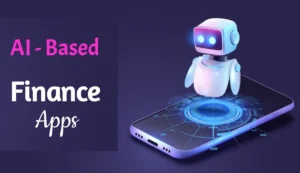In 2025, managing money is easier than ever—thanks to Artificial Intelligence (AI). With just a smartphone, people can now save, invest, borrow, and budget using smart AI-powered apps.
These apps work like personal money coaches, guiding users to make better financial decisions without needing to visit a bank or hire an expert.
Let’s explore how AI is changing personal finance and which mobile apps are leading this change around the world.
How AI Helps With Money
Conveying here at least five different reasons on how AI is helping dealing with personal finance in 2025,
AI Apps Helping People Around the World
Here are some popular AI-based mobile apps being used in different regions:
🇺🇸 United States
- Cleo: A fun, chat-based app that gives budgeting tips in a friendly way.
- Albert: Offers smart saving tools and access to human advisors.
- Dave: Predicts bills and offers early paydays without credit checks.
🇪🇺 Europe
- Monese (U.K./EU): Helps immigrants and people with no credit history manage money.
- N26 (Germany): Smart mobile bank with AI for saving and spending.
- Lydia (France): Easy app for payments, saving, and budget tracking.
🇮🇳 India
- Paytm: Widely used digital wallet with bill payments, savings, and voice support.
- ET Money: AI tools for smart investing and personal budgeting.
- Khatabook: Helps shopkeepers manage money and track payments.
- INDmoney: Uses AI to manage all accounts, track expenses, and give financial advice.
These apps are especially useful for people in rural or low-income areas who never had access to banks or financial advisors before.
Now, with voice-based features and regional languages, AI is helping more people learn how to manage their money.
Be Aware of the Challenges
While AI is very helpful, it’s not perfect. Some things to watch out for:
- 🔐 Privacy: AI apps need your data to work. Make sure you trust the app and have read the privacy policies completely.
- 🤔 Wrong Advice: AI may not always understand your unique situation. So do not depend on the artificial intelligence always, try making some use of natural intelligence also.
- ⚖️ Bias: If AI is trained on bad data, it might give unfair suggestions. Hence it is always better to prepare for both positives and negatives.
That’s why it’s important to use AI as a helpful tool—but still make final decisions yourself.
The Future of AI in Finance
Artificial intelligence is quickly becoming stronger and more useful. In the near future, you might see AI doing things such as:
- Filing your taxes automatically
- Guiding you through big purchases like a house or car
- Working alongside human advisors, giving them quick insights
- Keeping track of your goals, for example telling you, “You’ve already saved 90 % of what you need for that new laptop!”
In other words, AI could act like a round-the-clock money expert that fits in your pocket.
Why This Matters
AI tools already make managing money quicker and simpler, and they are starting to reach people everywhere—whether you live in a large city or a small village.
They can analyse data in seconds, spot patterns humans might miss, and offer instant suggestions.
Even though AI is extremely helpful, it is not a substitute for your own judgment. Think of it as a smart assistant, not a decision-maker.
Use its advice to stay informed, compare options, and choose what is best for you. By combining AI’s speed with your own common sense, you can reach your financial goals more confidently and much faster.

Leave a Comment